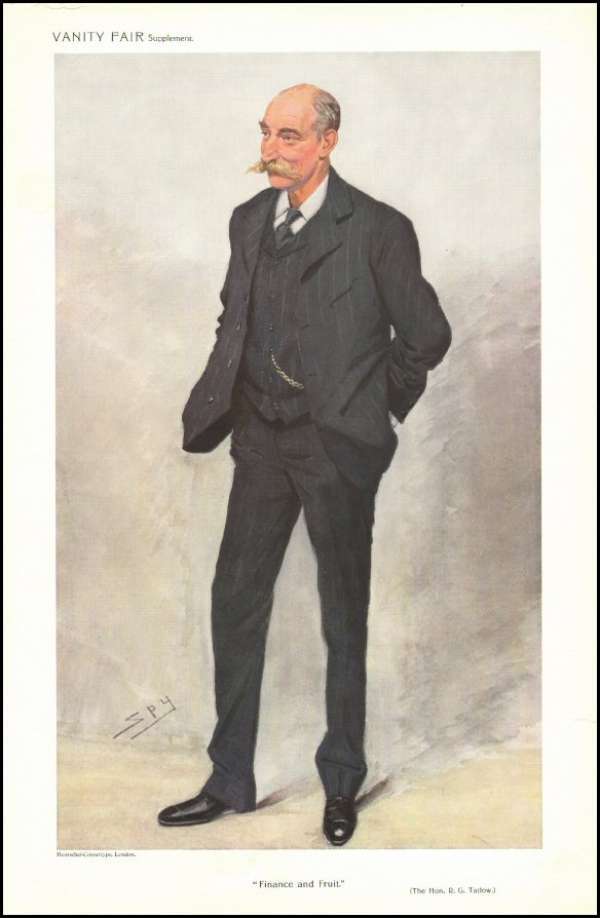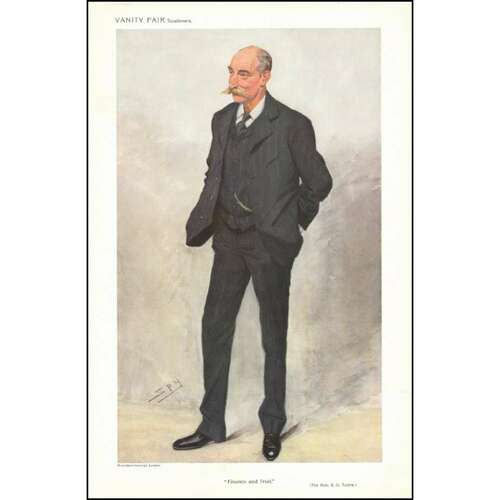
Source: Courtesy of Wikimedia Commons
TATLOW, ROBERT GARNETT, businessman, militia officer, office holder, and politician; b. 6 Sept. 1855 in Scarva (Northern Ireland), second son of John Garnett Tatlow and Anne Matthews; m. 8 Dec. 1880 Mary Frederica Leaycraft (d. 1886) in San Francisco, and they had one daughter; m. secondly 30 April 1893 Elizabeth Mary Cambie in Vancouver, and they had two sons and two daughters; d. 11 April 1910 in Victoria.
Educated at Cheltenham College in Cheltenham, England, Robert Garnett Tatlow came to Montreal in his mid teens. He found work with the Montreal Ocean Steamship Company [see Sir Hugh Allan*] and subsequently was employed in a brokerage office. Fond of soldiering and the outdoors, he joined the militia, enlisting in the 1st (Prince of Wales’s) Regiment of Volunteer Rifles as an ensign in February 1872. Gazetted captain by 1877, he became attached to B Battery of the Garrison Artillery in 1878–79. He served in Quebec City and on 13 Aug. 1879 arrived in Victoria on an inspection of coastal defences. Opting to stay in the city, he obtained the positions of instructor to the local militia and custodian of artillery stores. His background and personality fitted him into Victoria’s Anglo-Irish élite, and it was his Irish connections that in April 1880 netted him the post of private secretary to the lieutenant governor.
In April 1886 Tatlow resigned his position and moved to the newly created city of Vancouver to act as agent for the Vancouver Improvement Company, which owned a large part of the site. Until the end of the century he remained there as a real estate, insurance, and mining broker, and he was the president of the short-lived Vancouver Loan Trust Savings and Guarantee Company. He invested in mines, railways and other utilities, and a project to reclaim parts of the Fraser valley. A member of the city’s first park committee in 1888, he sat until 1905 and was chairman from 1895 to 1903. During his tenure Stanley Park was developed and nine new parks were added to the system.
A founder of the Mainland Association, which sought more representation for Vancouver in the Legislative Assembly, Tatlow ran unsuccessfully in the provincial elections of 1890 and 1894 but was returned for Vancouver City in 1900. On 18 June at a meeting of members-elect, he and his friend Richard McBride* moved a vote of no-confidence in Lieutenant Governor Thomas Robert McInnes which culminated in McInnes’s dismissal. Tatlow supported the government of James Dunsmuir*, formed that month. As a private member he introduced a bill to exclude Asian immigrants which was enacted later in the year. The legislation, requiring that all immigrants be able to write in a European language, was one of many such measures disallowed by the federal government. Tatlow would reintroduce it in 1902, with the same result.
In April 1901 Tatlow split with the government over railway policy. He generally opposed public aid to railways, believing that the lines would be built without subsidies. He reported that he was offered a position in the ministry of Edward Gawler Prior, which followed the Dunsmuir administration in 1902–3, but, with McBride, he refused since there was to be no substantial change of policy with respect to railways. When the Prior ministry fell, McBride formed a government and Tatlow entered the cabinet. McBride quickly went to the polls, and in October 1903 Tatlow was returned as a Conservative in the first British Columbia government to be constituted on party lines. He was minister of finance and of agriculture for the next six years, served briefly as commissioner of lands and works, and acted as premier and house leader when McBride was away.
As finance minister Tatlow was hailed as a saviour and a genius for rescuing the province from the bankruptcy it faced in 1903. That he was able to turn the 1903 debt of $12 million into an $8 million surplus in 1910 reflects the flow of revenue from the rapid sale of crown lands and forest rights, which was carried out on terms very favourable to purchasers. Another of his measures for raising revenue was to oblige commercial travellers and agents who were not resident in British Columbia to pay a licence fee, a requirement that brought the censure of national business organizations. As minister of agriculture he concluded an agreement with the Salvation Army to bring in one or two thousand British unskilled labourers and domestics to reduce the need for Asian workers.
In preparing for the 1909 election, McBride reversed his government’s long-standing policy and proposed guarantees to help finance the construction of the Canadian Northern Railway. Tatlow resigned in protest on 19 October. He died the next spring after being thrown from his carriage.
In his speculative investments Tatlow was representative of a large number of British Columbia capitalists in the era before World War I. The size of his estate, valued at $125,000, suggests that he had been quite successful. His career reflects the prominence of the Anglo-Irish élite in the province at the turn of the century and demonstrates the overwhelming importance of railways in the political and business agenda. Were it not for his exceptional behaviour in resigning over a matter of principle, Tatlow would also epitomize the businessmen-politicians who have been prominent in British Columbia politics since confederation.
BCARS, GR 443, box 23, file 1; box 59, file 6; GR 1415, file 1910/1614. City of Vancouver Arch., Add. mss 54 (J. S. Matthews coll.), 04480, file 7a; Add.
Cite This Article
J. S. Lutz, “TATLOW, ROBERT GARNETT,” in Dictionary of Canadian Biography, vol. 13, University of Toronto/Université Laval, 2003–, accessed December 30, 2025, https://www.biographi.ca/en/bio/tatlow_robert_garnett_13E.html.
The citation above shows the format for footnotes and endnotes according to the Chicago manual of style (16th edition). Information to be used in other citation formats:
| Permalink: | https://www.biographi.ca/en/bio/tatlow_robert_garnett_13E.html |
| Author of Article: | J. S. Lutz |
| Title of Article: | TATLOW, ROBERT GARNETT |
| Publication Name: | Dictionary of Canadian Biography, vol. 13 |
| Publisher: | University of Toronto/Université Laval |
| Year of publication: | 1994 |
| Year of revision: | 1994 |
| Access Date: | December 30, 2025 |



